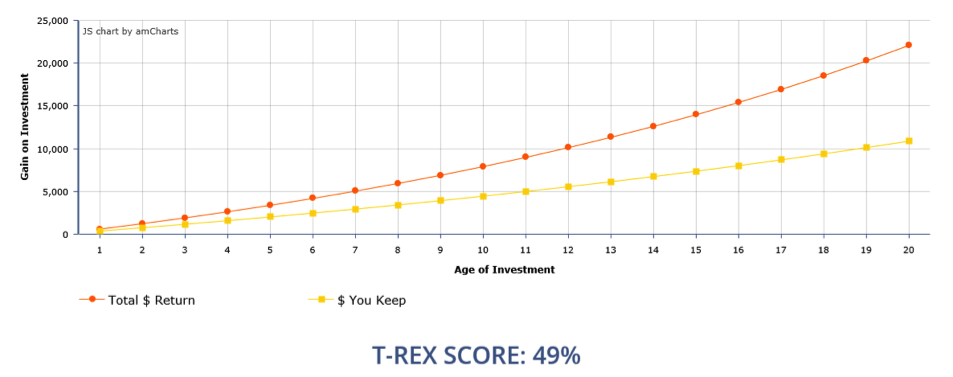** Special to The Just Word Blog with content from Larry Bates, Consultant and Author **
Foreword from James Gauthier
I had the opportunity to sit down and chat with Larry Bates not too long ago and learn about his approach to educating investors about the appalling amount of waste involved with investment fees. All too often investors overlook the true long-term impact of fees by looking at the simple, seemingly low, annual fee expressed as a simple percentage rate like 2.0% or 2.5%. When you account for your level of investment return and the impact of compounding over time, however, the actual amount of “waste” jumps dramatically.
The following is an introduction to the T-Rex Score, a simple way to evaluate how much waste may be in your investments…
How much of your investment returns will you actually get to keep after fees? For millions of Canadian mutual fund investors the answer will be somewhere around 50%. That’s right. Millions of Canadians are keeping only half of their investment returns. The rest is being wasted in fees.
How is this possible?
Find out at Wealthgame.ca. Just enter an investment amount, a time horizon, an estimated average rate of return (before fees) and your annual fees to get your T-Rex Score. T-Rex stands for “Total Return Efficiency index”. Your T-Rex Score reveals how much of your investment return you get to keep.
Example:
Investment Amount: $10,000
Rate of Return (average before fees): 6%
Fees: 2.25%
Time Horizon: 20 years
Resulting T-Rex Score: 49%
Through the magic of compounding, a 6% average return on $10,000 over 20 years produces a total gain of $22,071. But paying 2.25% in annual fees leaves you with only $10,882 (49%) of that gain. $11,190 (51%) of your return is lost in fees!
Try the T-Rex calculator for yourself. Experiment with different scenarios. See how T-Rex Scores vary under different assumptions. Choose a scenario, including an investment time horizon and return assumption, that best matches your circumstances.
In order to determine your Score, you will need to know the full amount of fees you are directly or indirectly paying. Despite recent regulatory initiatives, many investment providers do not clearly disclose total fees. Even if you believe you know the all the fees that are being deducted, request a full accounting of all fees from your provider.
Even better, direct your advisor to www.wealthgame.ca and ask them to calculate your T-Rex Score for you!
You can find typical Canadian mutual fund T-Rex Scores (and annual fee levels) at http://www.wealthgame.ca/mutual-fund-t-rex-scores/
Now that you have your T-Rex Score, you can make a judgement call: Are you receiving your fair share of your investment returns?
You may be satisfied with a very high T-Rex Score. Or you may find a lower T-Rex Score acceptable because the service you receive is worth it. If so, well done.
But what if you aren’t satisfied with your T-Rex Score? What if you are not sure what to think? What can you do?
Spend some time to learn investment basics and find a higher T-Rex solution that is right for you.
Larry Bates is Author of the forthcoming Book: The Wealth Game. For more information, please visit: Wealthgame.ca.
The views and opinions expressed in this article are those of the author and do not necessarily reflect the views of Justwealth, or its employees. The content of the article is provided solely for information purposes only and should not be construed as advice of any kind.
Submitted by James Gauthier, Chief Investment Officer at Justwealth


Comments are closed.